“Global Embedded Analytics Market to reach a market value of 147.9 Billion by 2031 growing at a CAGR of 14.2%”
The Global Embedded Analytics Market size is expected to reach $147.9 Billion by 2031, rising at a market growth of 14.2% CAGR during the forecast period.
Embedded analytics enables these organizations to monitor and analyze real-time data, such as service usage, network traffic, and customer support metrics, helping them identify issues and implement solutions swiftly. Additionally, the growing adoption of 5G and cloud services has increased the demand for analytics tools that efficiently process vast amounts of data. As digital transformation accelerates in this sector, embedded analytics becomes increasingly pivotal in maintaining competitiveness and operational excellence. Thus, the IT & telecommunications segment procured 27% revenue share in the embedded analytics market in 2023.
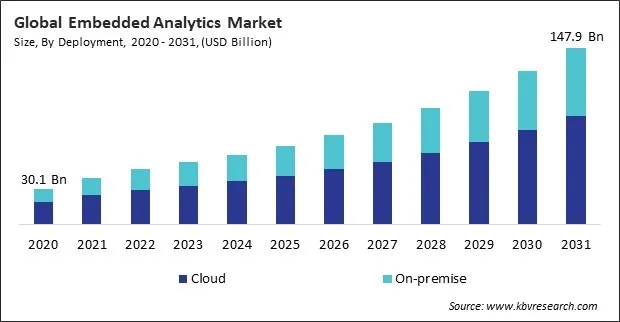
The major strategies followed by the market participants are Product Launches as the key developmental strategy to keep pace with the changing demands of end users. For instance, In September, 2024, OpenText Cloud Editions (CE) 22.2 introduces innovations focused on empowering businesses with secure data access, advanced integrations with Microsoft Teams, AI-driven processes, and enhanced content governance. It aims to improve customer, partner, and employee experiences, boosting productivity across ecosystems. Additionally, In June, 2024, Sisense launched its GenAI-powered Analytics Chatbot and enhanced narration tools, enabling users to query data in natural language and receive actionable insights. The tools, easily embedded into apps, improve decision-making and operational efficiency, aligning with embedded analytics market trends.
Based on the Analysis presented in the KBV Cardinal matrix; Microsoft Corporation and Google LLC are the forerunners in the Embedded Analytics Market. Companies such as IBM Corporation, and Sisense, Inc. are some of the key innovators in Embedded Analytics Market. In May, 2023, Microsoft introduced Microsoft Fabric, an AI-powered end-to-end analytics platform. It integrates core workloads like Synapse Real-Time Analytics, enabling the analysis of streaming data from IoT devices, telemetry, and logs. This enhances embedded analytics for businesses managing data across multi-cloud environments.
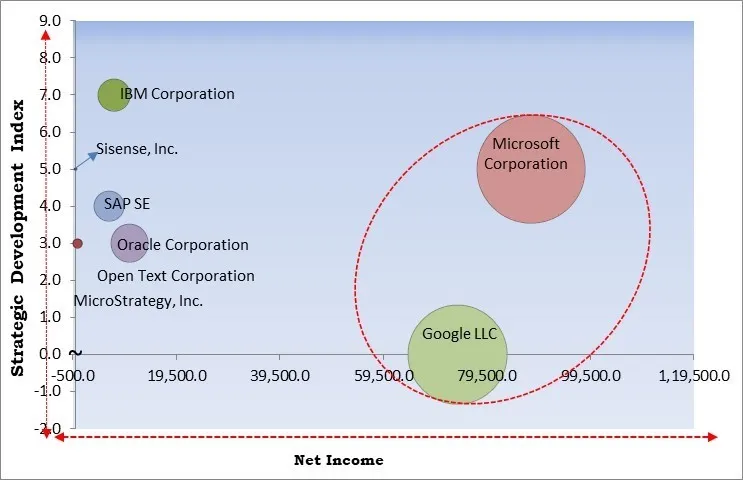
The proliferation of big data and the Internet of Things (IoT) in business operations necessitates advanced analytics tools. Organizations today generate vast amounts of data from various sources, including sensors, devices, social media, and transactional systems. This influx of data, while providing significant opportunities for insights, also creates challenges in processing, analyzing, and deriving actionable information efficiently.
Additionally, integrating artificial intelligence (AI) and machine learning (ML) into analytics tools has redefined the capabilities and applications of embedded analytics. AI-powered embedded analytics tools can automate the generation of insights by identifying patterns, correlations, and trends within datasets.
Developing and integrating embedded analytics tools into existing applications is not just a matter of deploying a solution; it entails a series of expenses that can quickly add up. Licensing costs for high-quality analytics software or platforms are typically substantial, particularly when advanced features or enterprise-level capabilities are required. For many, the perceived return on investment must significantly outweigh these upfront and ongoing expenses to justify the implementation. Hence, such factors may hamper the growth of the market.
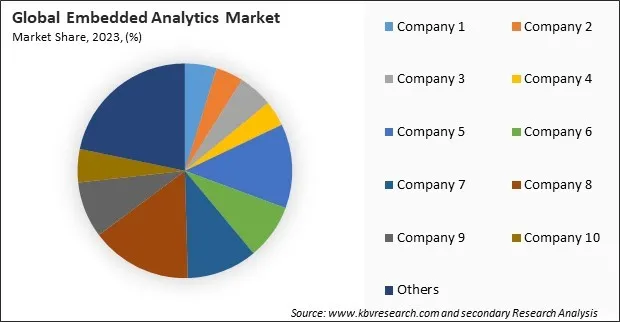
The leading players in the market are competing with diverse innovative offerings to remain competitive in the market. The above illustration shows the percentage of revenue shared by some of the leading companies in the market. The leading players of the market are adopting various strategies in order to cater demand coming from the different industries. The key developmental strategies in the market are Product Launches and Product Expansions.
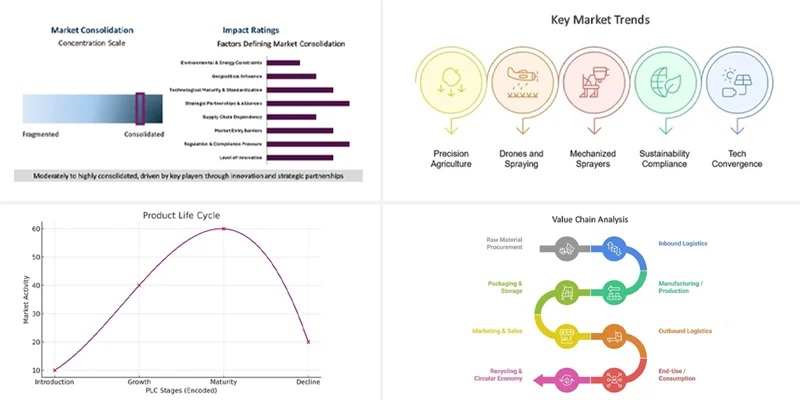

On the basis of enterprise size, the market is classified into large enterprises and SMEs. The SMEs segment recorded 36% revenue share in the market in 2023. Cloud-based deployment models have been particularly influential, allowing SMEs to adopt scalable and cost-effective analytics tools without extensive IT infrastructure.
By application, the market is divided into ERP/CRM, supply chain management, sales & marketing, logistics & delivery, and others. The ERP/CRM segment witnessed 28% revenue share in the market in 2023. Organizations increasingly rely on analytics embedded in ERP/CRM systems to gain real-time insights into operational efficiency, financial performance, and customer engagement.
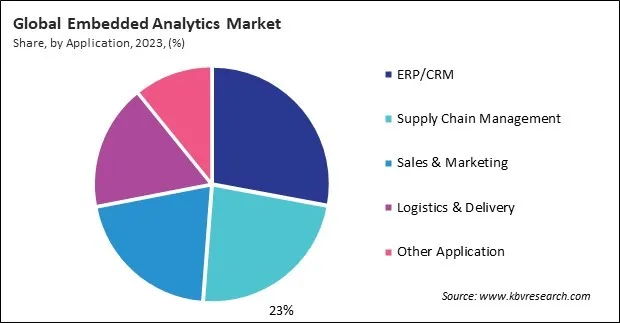
Based on deployment, the market is bifurcated into cloud and on-premise. The on-premise segment procured 37% revenue share in the market in 2023. Industries such as healthcare, banking, and government, which deal with sensitive information and strict regulatory frameworks, prefer on-premise deployments to maintain full control over their data and infrastructure.
Based on end-user, the market is segmented into IT & telecommunications, retail & consumer goods, BFSI, manufacturing, healthcare, and others. The retail & consumer goods segment acquired 21% revenue share in the market in 2023. The retail and consumer goods segment have gained significant traction in the market, driven by the sector’s focus on enhancing customer engagement and optimizing supply chains.
Free Valuable Insights: Global Embedded Analytics Market size to reach USD 147.9 Billion by 2031
Region-wise, the market is analyzed across North America, Europe, Asia Pacific, and LAMEA. The Europe segment garnered 31% revenue share in the market in 2023. Embedded analytics tools that are both secure as well as compliant are becoming increasingly popular as a result of the General Data Protection Regulation (GDPR) and other severe data protection rules in the region.
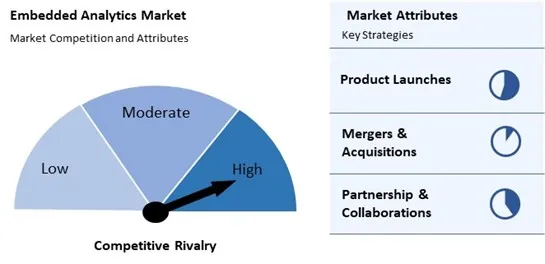
The Embedded Analytics market is intensely competitive, fueled by the growing demand for integrated data-driven insights within business applications. Key attributes include real-time data visualization, predictive analytics, self-service BI, and customization to enhance user experience and decision-making. The market thrives on trends like digital transformation, increasing data complexity, and the need for faster insights. Vendors prioritize scalability, user-friendly interfaces, and seamless integration into existing workflows to cater to diverse industry needs and drive operational efficiency.
| Report Attribute | Details |
|---|---|
| Market size value in 2023 | USD 52.1 Billion |
| Market size forecast in 2031 | USD 147.9 Billion |
| Base Year | 2023 |
| Historical Period | 2020 to 2022 |
| Forecast Period | 2024 to 2031 |
| Revenue Growth Rate | CAGR of 14.2% from 2024 to 2031 |
| Number of Pages | 308 |
| Tables | 473 |
| Report coverage | Market Trends, Revenue Estimation and Forecast, Segmentation Analysis, Regional and Country Breakdown, Competitive Landscape, Market Share Analysis, Porter’s 5 Forces Analysis, Company Profiling, Companies Strategic Developments, SWOT Analysis, Winning Imperatives |
| Segments covered | Deployment, Enterprise Size, Application, End-user, Region |
| Country scope |
|
| Companies Included | Sisense, Inc., Infor, Inc. (Koch Industries), MicroStrategy, Inc., Open Text Corporation, SAP SE, SAS Institute, Inc., Oracle Corporation, Microsoft Corporation, IBM Corporation and Google LLC |
By Deployment
By Enterprise Size
By Application
By End-user
By Geography
The Market size is projected to reach USD 147.9 Billion by 2031.
Exponential growth of Big Data and IoT are driving the Market in coming years, however, High implementation costs of embedded analytics restraints the growth of the Market.
Sisense, Inc., Infor, Inc. (Koch Industries), MicroStrategy, Inc., Open Text Corporation, SAP SE, SAS Institute, Inc., Oracle Corporation, Microsoft Corporation, IBM Corporation and Google LLC
The expected CAGR of this Market is 14.2% from 2024 to 2031.
The Cloud segment is leading the Market by Deployment in 2023; thereby, achieving a market value of $90.8 billion by 2031.
The North America region dominated the Market by Region in 2023, and would continue to be a dominant market till 2031; thereby, achieving a market value of $51.4 billion by 2031.
Our team of dedicated experts can provide you with attractive expansion opportunities for your business.
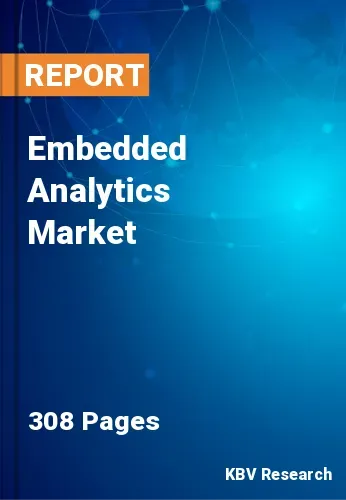
 Drivers
Drivers
 Restraints
Restraints
 Opportunities
Opportunities
 Challenges
Challenges
